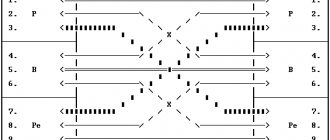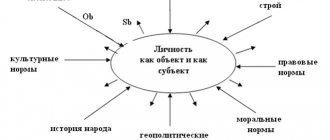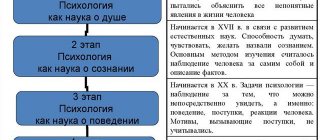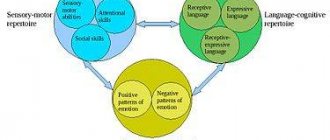Three personality states - parent, adult, child
Why do we sometimes speak to each other as if in different languages? Do we get a response that seems to be not our own response? Or do we unexpectedly react inadequately to innocent remarks? Transactional analysis can answer these questions.
Words play the most insignificant role in communication. The most important thing is the internal mood of each of the participants in the dialogue. Influenced by:
- Our own internal state through the prism of which we perceive communication
- The state of the interlocutor, which we read and react to
Thus, dialogue is always conducted at at least two levels - internal and external. And the main information from it sometimes passes by our consciousness. It is there that the keys to riddles are hidden like: “We were talking calmly, and she suddenly started crying” or “I just asked for help, and he decided that I was accusing him of laziness” and so on.
The answer to how and why this happens is provided by transactional analysis, a psychological model developed by American psychologist Eric Berne. He outlined it in his books on the psychology of relationships: “Games People Play” and “People Who Play Games.”
Three main positions in communication
According to this model, a person always takes a certain position when communicating. And it is she who determines how and to what he will react - and how others will react to him. These positions are called ego states and there are only three of them: parent, adult and child.
- The parent
expresses instilled stereotypes and ideas about life - Adult
– objective and reasonable approach to reality - Child
– spontaneity, creativity and self-expression
A little more detail about each of them.
Ego state "Parent"
The position of a parent is that of an elder. It can be expressed in both negative and positive manifestations. This is care and guardianship, but at the same time - control, coercion and teaching from above. This is a position of “should” and “obligation”, both in relation to oneself and to others. From this state we force ourselves and others to “take and do” something, we teach and explain, and from here we look after, feed, and protect.
A parent is an image of our real parents, which seems to be reflected in the psyche and remains with us forever. Naturally, the properties of this ego state depend on how our real mom and dad behaved with us.
E. Bern gives typical phrases from a parent in his book “Games People Play”: “I know better”, “I’ll explain it to you”, “I’ll help you”, “Who does that?”, “It’s forbidden”, "You must".
Ego state “Child”
Everything here is determined by desires and emotions. This state is characterized by: playful interaction, childish reactions, joy of life, spontaneity, but also fears, resentments and dependence. This is the “I want it, I don’t want it” position, a source of whims and pranks. Spontaneous manifestations, such as creativity, also arise in the child’s state.
A child is a projection of ourselves from childhood. Accordingly, his reactions and positions are the same as ours when we were children.
Typical phrases of a child: “I don’t want”, “I won’t”, “It’s so hard for me”, “Help, I can’t cope”, “You’re always pushing me”, “How wonderful!”, “I want”, “I like it.”
Ego state “Adult”
The position of an adult is the position of common sense, reasonable and adequate interaction. Here a person considers situations and events from the point of view of convenience and benefit, benefit for himself and others, and, importantly, from the position of equality of interlocutors. This is the part of the personality that makes plans, gets results, earns money. As a rule, in this state a person is calm.
This is “our own” part of personality, which is not a projection of us in childhood or a reflection of the image of our parents.
Typical phrases or thoughts: “Let's talk about this”, “I'm sure we'll find the right solution”, “If we go according to plan, we'll most likely work out”, “I believe...”.
How do ego states work?
All three states are very important.
Child functions
– to desire and create pictures of what we want, which will then stimulate us to act; add brightness to life; behave spontaneously and naturally, come up with new things, create, give ideas.
Parent functions
– take care of yourself and others, teach and explain, control what is done, observe social norms and prohibitions, approve and criticize, provide assistance.
Adult functions
– negotiate, adapt, correspond to reality, consider desires, plans and events as a whole from the position of common sense and benefit, act.
For example, how do we achieve our goals? The child sees what he likes and lights up with desire; the adult part evaluates the situation, looks for ways to achieve this, and makes plans. And the parent then controls and tells us - “go ahead, do it, you must”, checks the results, stimulates, reminds. He praises and criticizes, encourages further actions.
Brief essence of the theory
In the theory of transactional analysis, the unit of communication is transactions (stimulus and response). The Parent-Parent line is needed for casual conversations and gossip. Adult-Adult – work, business relationships. Child-Child – for feelings and love. When transactions coincide, communication lasts a long time. Violation of transactions causes disagreements, conflicts and inadequate psychological interaction (guardianship, tyranny, manipulation, suppression, whims).
Child
Child – “I want”, “I like”. There is no need to describe anything here, just remember the classic behavioral characteristics of children: true emotions are never hidden, they dictate words and actions. What else do children do? They are capricious, hooligan, cry, laugh, get scared, get offended. Their vocabulary differs in the following expressions:
- I want, I don’t want;
- Amazing;
- tired;
- when will this all end;
- to hell with it all;
- I will never agree;
- I love you madly.
That is, the child is ruled by emotions and feelings, which is immediately reflected in behavior and communication. The child is responsible for spontaneity, ingenuity, charm (natural child), but at the same time he can be capricious, aggressive, rebellious, whiny, touchy (adaptive child).
Rules for effective communication between parents and preschool children: take care of the child’s feelings
Emotionally, a child is equal to an adult. Parents, as a rule, tend to overestimate the child's intellectual development, but underestimate the strength of his feelings. The child perceives the world without rational understanding, mainly emotionally. One of the important rules for effective communication with a child is respect for his feelings. Underestimating a child’s feelings often means unjustifiably hurting him. Parents often try to control their child with feelings of anger, shame, and fear, forgetting how destructive these feelings are for a person. Publicly shaming a child who does not know how to use the toilet, laughing at a child when he has done something wrong, scaring him with an angry brownie when he does not want to sleep, teasing a child in the hope that he will stop being capricious, all of these, unfortunately, are typical techniques. parents, which they widely use when trying to achieve something from their children. The child’s grief seems like a discounted grief, unimportant, passing. You will be warned against such devaluation of the child’s feelings by the constant understanding that the child suffers just as much as an adult, and often it is much more difficult to cope with feelings.
The wounds that leave strong feelings in early childhood lay the foundation for the psychological problems that will manifest themselves in adulthood.
So how to communicate with a child correctly so as not to hurt the baby? When building relationships, parents must understand that the baby’s feelings are exactly the same as their own, and under no circumstances try to control the child by deliberately causing negative experiences in him.
Parent
Parent – “should”, “shouldn’t”. When the parent awakens in us, we take a “hands on hips” pose, point a finger, express contempt or condescension with a smile. The gaze is heavy and directed downward. The sitting position is relaxed, the body is slightly tilted back. The parent always defends his position, teaches others, and considers only himself right. In the vocabulary of such a person there are expressions:
- I won't stand for this.
- You are completely wrong.
- Do as I say.
- You are required.
- It is forbidden.
- A fool understands.
- You can't really do anything.
The parent always strives to catch the opponent, identify contradictions in his judgments, and prove the speaker wrong. It relies on the information that was received in childhood from the family and social environment: norms, requirements, prohibitions. “Do as I do or do not as I do, but as I say,” is the position of the parent. He controls and cares. When a parent is completely blocked, the person becomes unprincipled and forgets about morality and rules of behavior.
Characteristics of states
According to Berne's model of behavior, each individual in interpersonal interactions occupies one of three positions.
They can be briefly described as follows:
- a parent is stereotypes instilled in childhood;
- an adult is an objective assessment of the current situation;
- child - behavior based on emotions and unconscious reactions.
Parent's position
A person in this state behaves as if from above his experience, coerces, criticizes, teaches. This is a reflection of the image of parents, their behavior model.
The main word of the parent ego state is “must, must.” A parent can be caring, then he calms, helps and criticizes, who threatens, punishes.
A person utters characteristic phrases: “I know what’s best,” “I’ll tell you, I’ll teach you,” “You can’t do that,” etc. Typically, such behavior is applicable to raising children and being a teacher.
Often an individual enters a state unconsciously when he receives a corresponding message. For example, the reaction to a toy broken by a child will be the same as that of his parents.
Adult position
If an individual is in this state, he is reasonable, objective, reacts adequately to the current situation, is capable of reasoning, and does the right things worthy of an adult.
Typical phrases are: “Let’s discuss the situation,” “I’m ready for dialogue,” “We can find the right solution.”
This is that part of the personality that is formed by the person himself without the influence of parental attitudes.
Child's position
Personal behavior is determined by emotions and instincts. That is, a person behaves as he did in childhood.
This ego state is a reflection of the fears and experiences of childhood. It also shows the creative side of the personality.
In behavior, a child can be spontaneous when he acts directly on emotions. It can also be rebellious and adaptable. Basic phrases: “I want”, “I can’t”, “Give”, “Why me”, “If I don’t get it, then...”, etc.
Adult
Adult – “expedient”, “useful”. Outwardly, a person with his entire appearance makes it clear that he is focused on the object and the topic of the conversation: he leans forward with interest, looks directly at the object, his eyes are slightly widened or narrowed. Attention and interest are written on the face. The following expressions predominate:
- I probably didn't express myself correctly, since you didn't understand me.
- Let's discuss this.
- Please repeat again.
- How do you like this proposal?
In general, he is an adult: he solves problem situations productively, and thinks sensibly. It’s a pleasure to deal with him, of course, as an adult.
An adult is the most objective position. It does not depend on the script laid down in childhood. This is something that a person has learned himself. An adult acts according to the “here and now” principle. Rationally solves the current problem. You can develop this role endlessly, throughout your life.
Complete blocking of an adult leads to the inability to respond to changes in the world. Human thinking is responsible for this role; it is a personal feature of collecting and analyzing information. A developed adult decides which stereotypes of the child and parent to turn off in the current situation and which to turn on.
Functions
No person can remain in only one state all the time.
When exposed to certain stimuli, certain aspects of the personality are “turned on.” What matters is which ego is dominant.
All three states are important for interpersonal relationships and perform specific functions :
- The child’s task is creation, the creation of an emotional picture of desires, which will be a stimulus for further development. The child acts spontaneously, creates, gives birth to ideas.
- The task of a parent is care, training, guidance. Monitoring compliance with the rules, providing assistance, constructive criticism.
- The task of an adult is to adapt to the current situation, find a solution, and constructive dialogue. In other words, he must act in accordance with objective reality.
For example, a decision is made as follows:
- the child feels a desire to receive something, feels emotions;
- an adult is looking for ways to solve a problem;
- the parent monitors the correctness of execution, criticizes, guides, evaluates.
Examples of role mismatch
In life, role discrepancies are not uncommon, which is why conflicts arise. Here's what it might look like in different areas.
Family
The husband, from the position of an adult, asks: “Darling, do you know where my tie is?” The wife, from the position of a parent, replies: “Where you left him. How small! "
In sales
The buyer, from the perspective of an adult, asks: “How much does this dress cost?” The seller answers irritably from the position of a parent: “You don’t have eyes, can’t you see it yourself?”
At work
A young specialist turns to a colleague or manager for help from the position of an adult: “Could you tell me which algorithm and program is best to use to solve this problem?” And in response he hears an irritated parent: “It’s high time to understand and know this yourself.”
In all three cases, an unprepared person who does not know role theory will also begin to play the role of a parent. As a result, endless reproaches and complaints will pour in from both sides. But if you learn to conduct transactional analysis and identify the positions of communication partners, then you can prevent conflicts in time.
Classification of parenting styles in psychology
The system of educational techniques is an unconscious set of methods. Awareness includes:
- understanding the goals of education;
- choice of techniques;
- setting goals;
- analysis of methods, taking into account experience.
There are 5 main types of educational influence:
- Guardianship. Parents provide all the baby’s needs, depriving him of initiative and the opportunity to take care of himself. The result of such upbringing is a person’s complete unadaptability to life. The child's independence is blocked.
- Dictatorship. Signs of dictatorship are coercion, ignoring the interests of the child, physical or mental abuse when trying to show resistance.
- Non-intervention or liberalism. One side of the issue is taking into account the interests of adults and children, on the other - coldness, inability of parents to learn to communicate, emotional distance.
- Cooperation is the most constructive community of close people, where everyone has the right to seek help.
- Parity is a group in which family members act according to a plan that ensures that all people get what they want.
In single-parent and two-parent families, mothers are involved in raising children. The father's role is to provide financial support for the cell's needs.
How to use Berne's theory in communication
When we are exhausted and excited, then addressing us from the position of an adult can be regarded as an attack on our inner child. Who stands up for the children? Right. Parents, but they inadvertently (or deliberately) offend their children. So children and parents will fight until someone gets tired of it, or rather, until the body of one of the participants fails (hysteria, hypertension, fainting).
In general, the continuation of the story depends on the strength of expression of each of the roles in a person. If the parent is weak, then the person will face the reproach in silence, swallow and leave, complaining about his unfortunate fate. This does not change the essence: the problem will remain unresolved.
If you visually imagine a formed group of communication participants (two adults, two parents, two children), then this bazaar will start to give you a headache. But the problem is that only adults, who cannot be heard over the screams of parents and children, can solve problems productively. As a result, the problem either remains unresolved or is resolved after a scandal. But why then waste time on it? Isn’t it easier to immediately answer your opponent correctly?
Conflict, or rather resolving disagreements, can and should be done from the perspective of adults. This is called a productive conflict, the goal of which is to get to know each other better, understand and come to a common decision.
Psychological flexibility and the ability to outwardly obey will help with this. The point is that you agree with the claim presented to you, then compliment your opponent and repeat the request. In our example with a family, it may look like this: the husband will answer that he is really like a child, but his wife is smart, always knows where and what is, neat, and, of course, will help him find a tie and teach him how to maintain order.
This is not weakness, not a humiliation of personal dignity (probably now the child in you has spoken to you, who does not want to do this). This is a manifestation of the flexibility of the mind and psyche, the answer of an adult who is ready to quickly and constructively solve problematic issues. Flexibility implies the ability to easily and quickly adapt between the internal roles of an adult, a child and a parent. If this mobility is not present, then it is noted:
- the powerlessness of an adult under the dominance of a parent or child (I understood everything, but could not do anything);
- Indulgence of a parent to a child (for example, satisfying one’s “wants” against the backdrop of a weak financial situation or celebration, loans for a wedding).
A flexible person knows how to be different:
- At work, give priority to the adult, and place the child in last place.
- With friends in an informal setting or with a loved one alone, he will give free rein to his inner child.
- To fulfill traditions and norms, you will need a parent.
It is very good if your partner also has this psychological flexibility. Well, if it doesn’t, then you already know how to deal with it. How to develop a dominant adult role:
- Learn to respond promptly to the first calls from a child or parent, do not make automatic decisions, learn to calm down and wait. Self-regulation will help with this.
- Train yourself to ask in moments of doubt: “Is this true?”, “Where did this thought, desire come from?”, “Is this acceptable in this case?”
- When you are in a bad mood, ask yourself what or who the inner child is offended by.
- Learn to bring your partner into the role of an adult. To do this, it is enough to answer a couple of times according to the method described above, for example, to a boss who demands an impossible task and exclaims “Figure out how to do it yourself, after all, what are you here for!”: “If I knew how to do this and could think as good as you, then long ago I would have been a boss, not a subordinate. So how to do this? Yes, perhaps you will receive a few more reproaches, but if you remain as brave as you are, then all that remains for the boss is to descend from the position of a parent to the position of an adult. So, in order to bring your partner to the position of an adult, you need to agree with his reproach, and then ask a question.
- Never look down. It is ideal to look eye to eye. This is the position of an adult. The parent looks down from above, who in Bern's theory always attacks, makes claims (although sometimes takes care of him). It’s better to look a little from below (this is a child surrendering to the power of a partner), but behave like an adult.
Transactional analysis
The twentieth century gave the world many outstanding people. One of them is the American psychologist and psychiatrist Eric Berne (1910-1970), the creator of transactional analysis. His theory has become a separate popular trend in psychology, incorporating the ideas of psychoanalysis, behaviorism, and cognitive psychology.
E. Berne presented the theory of transactional analysis in a language accessible to readers in several works. Many of them have been translated into Russian and have remained bestsellers for more than half a century. His most famous books are: “Games People Play”, “People Who Play Games”, “Beyond Games and Scripts”.
And in the book “Transactional analysis in psychotherapy. Systemic Individual and Social Psychiatry” contains the entire coherent theory of E. Bern, and not only its main blocks, developed in subsequent publications - the analysis of games and scenarios - but also aspects that the author does not set out in his other books.
E. Bern
In a practical sense, transactional analysis is a system for correcting the behavior of individuals, couples and small groups. After familiarizing yourself with the works of E. Bern and adopting his concept, you can independently adjust your behavior so as to improve relationships with the people around you and yourself.
The central concept of the theory is transaction - the act of interaction between two individuals entering into communication, the basis of interpersonal relationships.
It is difficult to literally translate the word “transaction” from English, but in terms of meaning it is most often interpreted as “interaction,” although a transaction is not the entire interaction, but only its element, a unit of communication. Human interactions consist of many transactions.
A transaction includes a stimulus and a response. One person says something (stimulus), and the second person responds something (response).
A simple transaction example:
- Can I help you? (stimulus) - No, thank you, I’ll do it myself. (reaction)
If interaction were based only on the “stimulus-response” scheme, there would not be such a variety of human relationships. Why does a person behave differently with different people and reveal himself in a special way in his interactions?
The fact is that when communicating, one individual comes into contact with another person as a person with a person, or more precisely, some part of his personality with a part of the personality of another person.
Afterword
What is the difference between a constructive business conflict and a destructive one? In constructive, people discuss contradictions and try to understand the opposite side for the sake of a common solution and clarification of the truth. In a destructive argument, people try to defend their point of view and win. But is it possible to win? Are there any winners in a broken family, a layoff, or a fight? No. Each side will feel sorry for itself and consider itself betrayed.
The inability to psychologically competently resolve conflicts and be flexible in roles leads to relationships becoming chronically emotionally tense. As a result, they either fall apart, or the participants develop psychosomatic illnesses and neuroses. Berne's theory is a useful basis for studying the problem of conflicts (in the family, at work, in any interpersonal interaction) and their resolution.
The dangers of being on the list of “debtors”
Photo by MART PRODUCTION: Pexels
Fortunately, there is not and cannot be a set of rules on which long-term relationships will be based. Because any free person has the right to decide for himself what and to whom he owes.
Family psychologists know that most family conflicts begin with the word “should.” Moreover, this word may not even be pronounced, which is most often the case.
This “duty” is a silent expectation that this is how things should be. Unfortunately, the other person sometimes doesn’t even know what is expected of him.
People a priori think that their expectations are self-evident, they are obvious and the beloved “could have guessed it himself.”
All these feelings arise from the fact that your expectations were not met. Should they have come true? Have you put effort into this? After all, relationships are, first and foremost, what people invest in each other.











